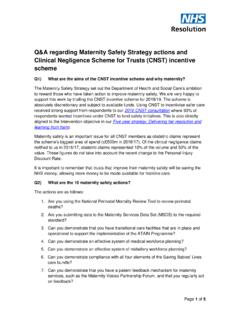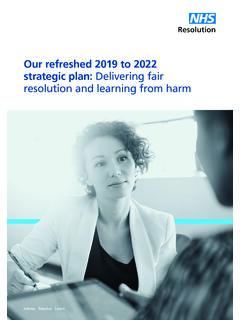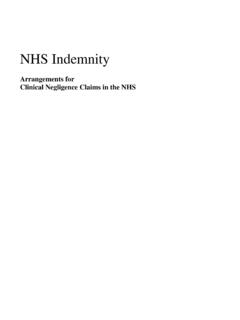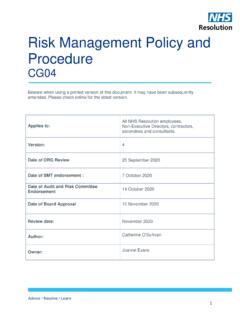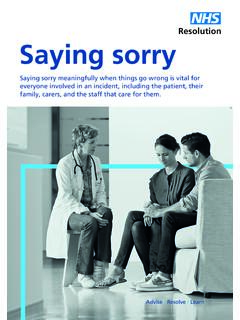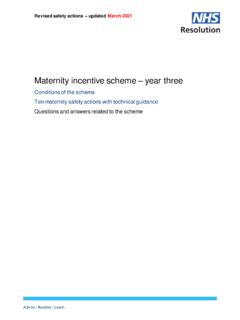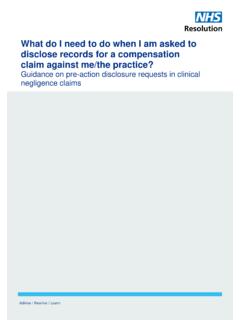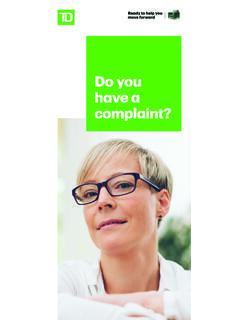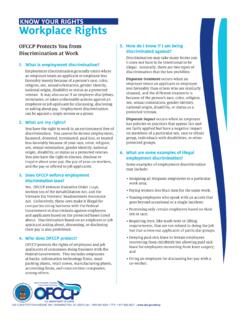Transcription of Responding to complaints - NHS Resolution
1 1 Responding to complaints Guidance for general practice under the Clinical Negligence Scheme for General Practice (CNSGP) 2 Effective local complaints handling is not only the right thing to do for patients but can help to prevent a concern escalating into a claim for compensation. This guidance provides some information on best practice. Transparency with patients is critical throughout and is supported by NHS Resolution . We will never refuse you cover under CNSGP because an apology has been given, either in response to a complaint or otherwise.
2 An apology is not an admission of liability and should always be given where warranted. For further information about apologies, please see our guidance Saying Sorry CNSGP responds to formal claims for compensation and does not include the management of complaints , which should be dealt with locally. What do I need to have in place in order to deal with complaints ? GP practices are required by law (the regulations) 1 to have arrangements in place for dealing with complaints . complaints must be properly investigated and dealt with efficiently.
3 Complainants must: Be treated with respect and courtesy; Receive a timely and appropriate response to their complaint; Be told the outcome of any investigation; and Be told about any action taken arising from the outcome of their complaint. CQC inspectors may ask the practice about how it learns from complaints and how it seeks to improve its service. Each practice must have a responsible person to ensure compliance with the Regulations and a complaints manager who is responsible for dealing with complaints .
4 The responsible person must be a partner in the practice or the sole proprietor, but their practical responsibilities can be delegated. The complaints manager can be shared between practices if a full-time role is not required, and the complaints manager may also delegate their responsibilities. The practice must make its arrangements for dealing with complaints available to the public. It must also inform the public about how to obtain further details about the complaints arrangements. 1 Local Authority Social Services and National Health Service complaints (England) Regulations 2009 3 Who can make a complaint?
5 A patient or someone who is affected, or likely to be affected, by the action, omission or decision of the practice, its GPs or its staff can make a complaint. complaints can also be made by a third party on behalf of someone who has died, is a child, or is unable to make the complaint because they lack capacity. Complainants are entitled to request that a representative act on their behalf this could be a family member or a professional representative such as a solicitor. If the complaint is being made by someone other than the patient or person affected, you should satisfy yourself that that person has the authority to make the complaint on the patient s (or other affected person s) behalf.
6 Your duty to protect your patient s confidentiality is not removed when dealing with a complaint. Are there time limits for making and Responding to a complaint? Ordinarily, a complaint should be made within 12 months from either the date of the incident or the date that the complainant first knew about it. However, a complaint should not be automatically barred on the basis that it is late . The responsible person should still consider the complaint if: The complainant has good reason for making the complaint late ; and It is possible to investigate the complaint effectively despite the delay.
7 A complaint can be made either orally or in writing (including electronically). If a complaint is made orally then the practice should write it down and give a copy to the complainant. If an oral complaint is dealt with to the complainant s satisfaction within 24 hours then there is no need to follow the formal complaints process. When following the formal complaints process, the practice must acknowledge receipt of the complaint within three days of receipt of the complaint. The acknowledgment can be done in writing or on the phone, and must offer to discuss the following, at a time to be agreed with the complainant: The manner in which the complaint will be handled; The period within which the investigation is likely to be completed; and When the response is likely to be sent to the complainant.
8 If the acknowledgement is done on the phone, the content of the discussion should be written down in the complaint file. The complaint file should be kept separately from the patient s medical records. If the complainant does not accept the offer of a discussion, the practice must write to the complainant to confirm the matters listed above. There is no timescale for providing a response but the regulations specify that the complainant should be updated, and informed of the reasons for the time taken, in writing if there is no response provided within six months.
9 4 The complaint response Once the investigation into the complaint is completed, the complainant should be sent the outcome in writing. The complaint response should: Be professional, well thought out and sympathetic; Deal fully with all of the complainant s complaints ; Include a factual chronology of events which sets out and describes every relevant consultation or telephone contact, referring to the clinical notes as required; Set out what details are based on memory, contemporaneous notes or normal practice; Explain any medical terminology in a way in which the complainant will understand.
10 And Contain an apology, offer of treatment or other redress if something has gone wrong. The response should also highlight what the practice has done, or intends to do, to remedy the concerns identified to ensure that the problem does not happen again. The response should inform the complainant that they may complain to the Parliamentary and Health Service Ombudsman if they remain dissatisfied. Bear in mind that the response will likely be read by the complainant s family and possibly legal advisers. In most cases a complaint will not lead to a claim for compensation.
